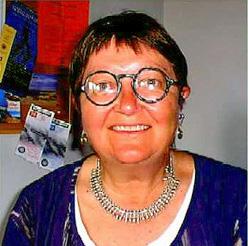
- My experience over this past year has been a profound one. Coming to Norway, speaking Danish from my childhood and being familiar with Danish cultures has helped me to feel very much at "home". Yet.... Not quite, and it is this subtlety of dislocation, in culture and language, that has focused my perceptions.
- But these are my formal professional identities. My life and personal identities perhaps have more to do with my interest and connection to Tromsø and Norway. My identities and experiences of being between things, on the edge of intersecting cultures, have made me very sensitive to my position in Tromsø as a visitor, yet not really an outsider but somewhere on the border where the cultures overlap. I am a transplanted Dane to the United States -- born in Copenhagen, Denmark and moved with my family to the United States when I was six years old. In the USA I have always felt my Danish heritage very acutely; my parents maintained our "morsspråk" in our home growing up and with that, many Danish traditions. Yet in my public life (school, friends etc.) I grew up "American".
- Being here in Tromsø, I feel like a transplanted Danish-American, settling down in Norway, this time for one year, but with many planned returns professionally and personally. Anticipating my stay in Norway in ‘96, I expected to feel comfortable almost immediately, assuming that my Danish roots would make me familiar to the Norwegian culture and language. I had not anticipated the differences in many daily traditions, history and language, especially in Nord Norge. I quickly became aware of the significant role that language plays in Norwegian culture and how different it is to what I had known before. I could read Norwegian because of the similarities to Danish, but I was quickly sensitized to the political significance of nynorsk and the many dialects. From the first day, I heard people identify others (their geographic origins within Norway) by their dialects. I learned through experience about the political importance to some people of using nynorsk in both their written and spoken communication; about the differences in both meaning and pronunciation between Norwegian and Danish. I realized the significant role that language plays in the daily experience. And I felt like an outsider yet not really an outsider. For this reason my research project has shifted somewhat during the time I have been here. I have become more focused on looking at how culture affects language and vice versa, how location affects culture and language, gender/ identities and language are used in textual representation in the documentation of nursing practice. My project specifically explores this textual language as this nursing documentation moves from a handwritten format to an electronic one.
Research project in Norway
- My project was originally entitled The Ethics of Care and Information Technology: A Study of the Impact of Automation on Nursing in Norway , and it is a qualitative study of three principal areas: phenomena of caring and communication in nursing practice; the process by which the Norwegian state is developing plans for the implementation of information technology in the five regional hospitals in Norway; and the ways in which nurses themselves adapt this technology to their practice. In this first phase of my research, I have interviewed nurses at RiTø (Regionsykehuset i Tromsø). Through these focused interviews, review of memos, minutes and reports, I hope to identify how communication (verbal and written) is used by nurses in their practice. Communication plays a significant role in developing the nurse-patient relationship, and the documentation of that care should reflect the uniqueness of the emotional and therapeutic connection between provider and patient. Will automation affect this process and format? Nursing is predominately a women´s profession and many have written about the male gendering of technology. I am interested in exploring this gendering through the representation of a practice in text in this process of documentation.
Past research and work
- My research background and language skills in Danish have put me in an excellent position to explore these ideas. My professional and academic career has integrated the critical knowledge and skills of a nurse clinician and teacher, with those of a researcher and scholar in the field of Environmental Psychology. During the past ten years, my academic and research pursuits have built upon my nursing career to provide me with a unique expertise in theory, practice and research that crosses disciplines and cultures. I have pursued studies in history, new technologies, organizational systems, communication theory, gender studies, psychology, architecture and design, and integrating these theories into my study of computer-mediated-communication and documentation, and focusing on women workers and nurses specifically. In each of these research areas I have integrated my experience as a psychiatric nurse clinician and teacher with a multi-disciplinary focus to critically explore issues of relevance to professional nursing today. Through my experience as a psychiatric nurse clinician I have learned the value of communication (verbal & non-verbal) to the complexity of human relationships and experiences. The significant role of communication extends beyond its use in therapeutic treatment, into the presentation of one´s role as clinician and teacher. Environmental Psychology has taught me to appreciate the importance of understanding the interactions between the environment and people (the significance of context), and the dynamic effect on human potential.
- For the past ten years I have been studying the social and work implications of information technology. My dissertation, entitled Nursing and Computers: Caring in the Context of Information Technology, studied the impact of information technology on the roles and experiences of nurses in a specific hospital setting in the US. This study raised questions about the role of computer technology in the development of nursing relationships and expertise in practice. My doctoral work provided a foundation for my subsequent research.
- While I was a Visiting Research Scholar at the Centers for Research on Women at Wellesley College (1995/97), I focused my research on the relational dimension of work place contact; my project, Reach Out and Touch Someone: Women and Professional Networking on the Net, explored the effect of computer-mediated -communication on women´s identity and professional networking. I went on to conduct a study (Do you know who you´re talking to? Identities on the Internet) of how women identified themselves in these electronic interactions by looking at the ways that the female students used the electronic bulletin board on campus to discuss and connect with each other. I am very interested in understanding the ways that women use textual language in this electronic medium to connect/ communicate with others.
Women´s studies and gender research
- I have considered myself a feminist since the early ´70´s when I became active in grassroots political work with sexual harassment in Cambridge, Massachusetts. At that time, my (our) analysis focused only on women as the universal identity, then to make connections to understand oppression and power in our daily lives. Over the years I have come to see women´s studies and gender research as a window or gateway into exploring the complexity of people´s lives. It has given me the critical language to explore the ways that our differences and similarities along sexualities, genders, classes, ages, races etc. affect the ways that we experience all aspects of our lives, what power dynamics affect these experiences. I see the theories that come out of gender research as an organizing framework to ask these questions. My grassroots political work gave me the personal connection to this research, and the scholarly writings and discussions have given me the interpretative language. Because of the awareness of these complexities and intersections of identities over time and space, I try to think about my own work from these contextual positions. I try to critically explore the impact of information technology in women´s lives while recognizing the diversity of who women are and the active role that women have in this evolution. Information technology (as other technologies) is not neutral and not deterministic in the outcomes. For this reason, my choice of methodologies has also moved from a predominately quantitative exploration to a qualitative approach. I also spend significant time analyzing my own role as a researcher and woman in the information that I receive. Women´s studies and gender research provides me with the foundation to all parts of my work and research.
- I am a currently a Fulbright Professor in the Department of Nursing Science (ASV), Institute of Clinical Medicine (IKM) at the University of Tromsø 1998/99. I am a psychologist (PhD in Psychology 1991) and a psychiatric nurse. Back at my home university I am an Associate Professor in the College of Nursing at the University of Massachusetts/ Boston. My relationship/ connection with Tromsø began in 1996 when I was invited to be a Visiting Professor during the Fall Semester. The connections I have made here are deep ones, professionally and personally and I know that these relationships will continue to develop over the next years.
Du kan kontakte Lena Sørensen på epost:
lenas@fagmed.uit.no eller sorensen@umbsky.cc.umb.edu
